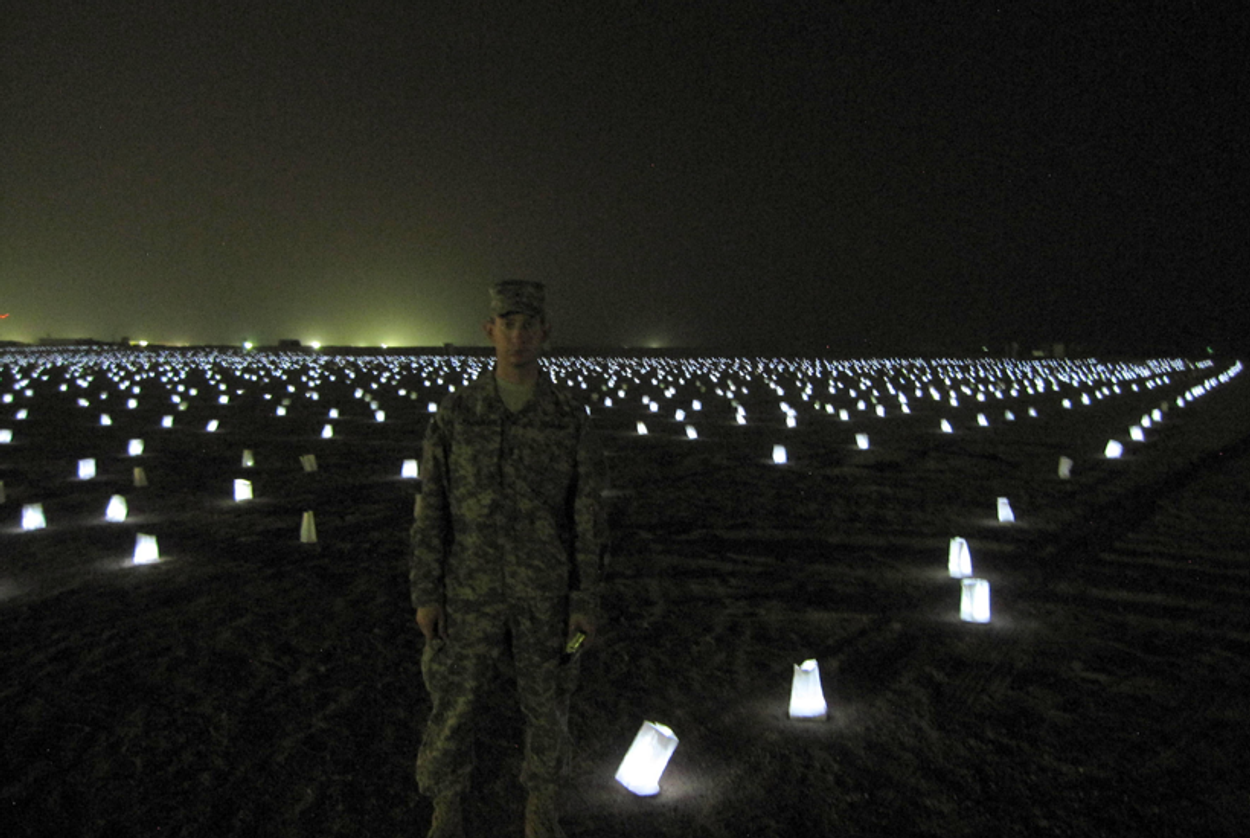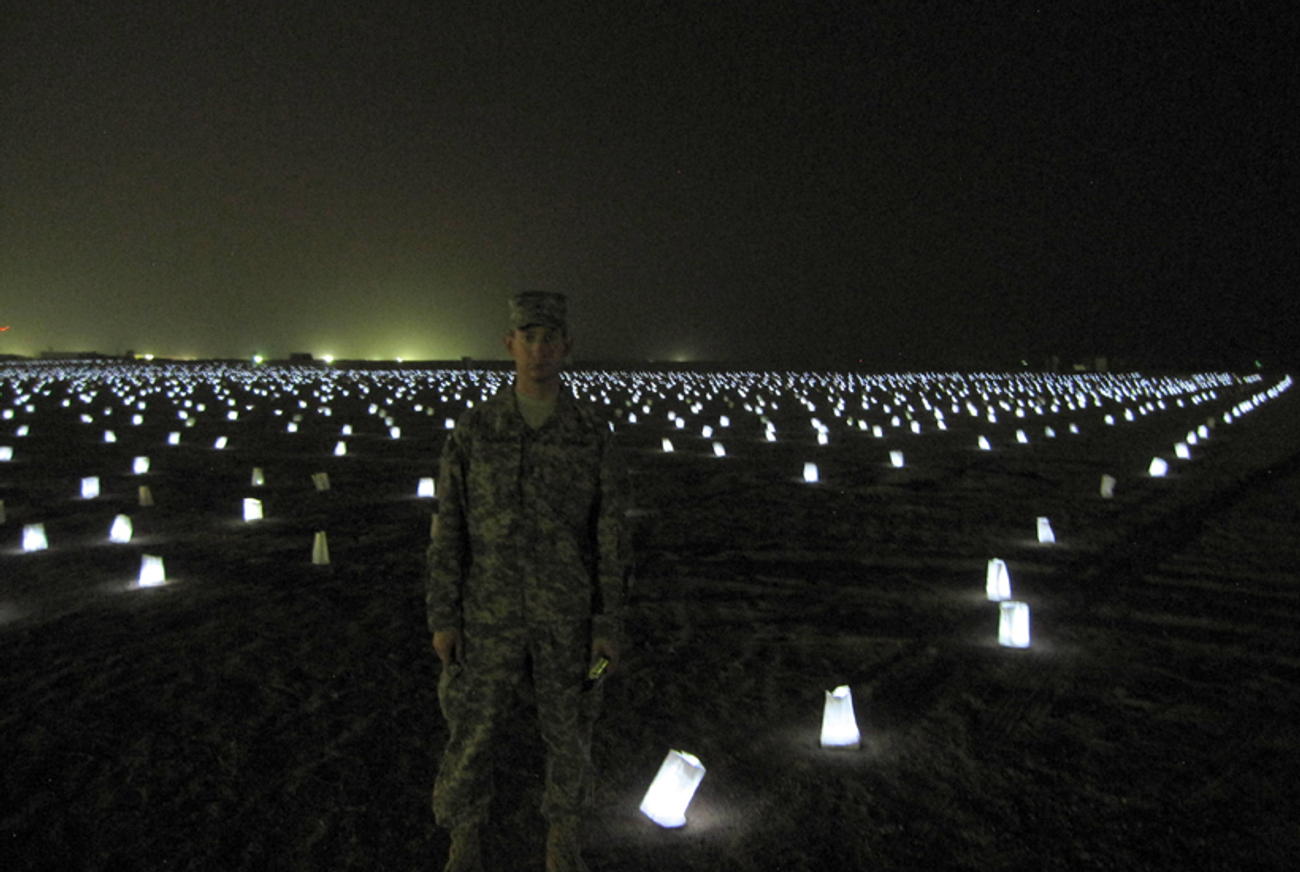An Army Chaplain’s Memorial Day of Hope
How one cantor gained a new view of the holiday, and a belief in a brighter future




One year ago this month, I gazed out the window of a UH-60 Blackhawk helicopter, lifting off from Camp Arifjan, Kuwait. I was a third of the way through my first overseas deployment as a U.S. Army chaplain, and the novelty was definitely wearing thin. The training and anticipation during my nine-week pre-deployment mobilization at Camp Shelby, Miss., had rolled into an exhilarating first month in Afghanistan, but now I had landed in Kuwait, where the mission was a little less immediate. I didn’t have time to think about it as I struggled to learn the layout of a sprawling, unfamiliar post and worked to prepare a Shavuot program for its Jewish personnel. Once that program concluded, however, my thoughts turned to Memorial Day, which fell just one day after Shavuot in 2012.
Just as the world of harvest pilgrimages to the ancient Temple for Shavuot seemed strange and remote in the 21st century, so did the Memorial Day services I attended seem incongruous with my world of privilege and peace growing up on Manhattan’s Upper East Side or attending college at Yale. I was pretty sure I knew the “right” way to behave at such events: meditating vaguely on the tragedy of young lives lost and the courage of everyday heroes, probably while crying. Without a personal connection to the military, however, the whole thing seemed very theoretical, like offering animal sacrifices to the Levitical priests, and grief doesn’t work as a purely intellectual exercise. Following the example of the rabbis, then, who had shifted Shavuot’s focus from agriculture to revelation, as I became an adult—enrolling in Hebrew Union College-Jewish Institute of Religion’s cantorial training program at the Debbie Friedman School of Sacred Music in New York, putting Jewish music forever at the center of my life—I infused Memorial Day with my own new meaning: The day became a sacred time to maintain the garden of my college friendships in a time of our post-undergraduate diaspora.
The year before my Army deployment, I’d enjoyed a retreat in the Shenandoah Valley with some fellow alumni of Magevet, Yale’s Jewish a cappella group. We had explored Luray Caverns, climbed Old Rag Mountain, and spent an entire afternoon singing z’mirot in harmony. The Mishna explains that certain things that appeared at unique moments in history, like the rainbow after the flood, were designated for special purpose from the very beginning of Creation. As I reflected back on the weekend’s miraculous combination of good weather and good friends reunited, I thought perhaps God had essentially created Memorial Day for me.
A year later, though, worlds away from everyone I loved, I approached the holiday with a sense of emptiness behind a façade of proper military respect. I had thought that perhaps after I joined the military—a decision I’d made after learning about the shortage of Jewish chaplains serving Jewish troops who were deployed overseas—Memorial Day’s original meaning as a time to honor our fallen soldiers would have suddenly become more urgent to me. But that hadn’t happened—yet.
The Blackhawk headed north for Camp Buehring, about 30 miles from the Iraqi border. Buehring’s command chaplain, a United Methodist minister, and his religious support team were holding an interfaith Service of Remembrance that evening, and he had invited me to participate. There were plenty of these events at Arifjan, and a trip to Buehring—with its frequent dust-storms and triple-digit temperatures—was usually something I tried to avoid, but I was flattered by the offer and hoped the travel might actually clear my head of unproductive ruminations on how much time remained on my deployment.
Buehring’s Memorial Day program kicked off after sundown, starting with a commemorative run from the front gate out to a motor pool three miles away. As I stepped out of the chaplain’s SUV near the finish line, I came face to face with the most striking military memorial I’d ever seen. The USO had partnered with the Army to create a tribute of 6,500 paper lanterns arranged in rows over a huge swath of the motor pool, like a glowing white cemetery—one lantern for each of the soldiers, sailors, airmen, and marines killed in action since Sept. 11, 2001. Next to the memorial, by the podium for the service, the faces of the fallen streamed in a slideshow across a concrete wall, while the mournful strains of the Band Perry’s song “If I Die Young” filled the silence. I joined a crowd and stood there, watching the faces flash by, listening to the music.
Lord make me a rainbow, I’ll shine down on my mother
She’ll know I’m safe with you when she stands under my colors, oh well
Life ain’t always what you think it ought to be, no
Ain’t even grey, but she buries her baby
My mind drifted to the few connections to fallen soldiers or their families that I had gained as an adult. Chase Comley, my high-school baseball teammate who was killed in Iraq in 2005, and Adam Wolfer, a Jewish officer killed there three years later. I had met Maj. Wolfer’s sister by chance at the Lexington Avenue armory, just as I was joining the National Guard, and she was starting a foundation to support Jewish soldiers in his memory. I thought of a girl who my sister and I had met while standing on line for theater tickets on West 49th Street, just before I deployed. She had come from Wisconsin to study at NYU after her brother was killed in Afghanistan and left her all his money. And then there were the people whom I didn’t know at all but whose loss, for some inexplicable reason, seemed that much harder to bear. Suddenly, I was overcome with the most intense and beleaguering sadness. I lost track of time and space and just stared at the pictures, hypnotized, supported by the music as it carried me from face to face, smile to smile
The soldiers participating in the run had been given colored glow-sticks (chem-lights, as they’re called in the Army), and it was the flickers of these colors in my peripheral vision that roused me out of my trance. I watched as they finished the final mile and came into view of the memorial, and you could feel them realize that they had unexpectedly come upon a holy place. Sweaty and winded from the run, visible only by the colored chem-lights that dangled from every part of their running clothes, they explored the memorial in whatever way seemed most natural in the moment. Groups of them clumped together to watch the slideshow while others wandered around the glowing cemetery, silently communing with memories of the friends they would never see again.
The service was short, not more than 25 minutes. Conducted entirely in the dark, illuminated only by the soldiers’ chem-lights, the podium, and the slideshow, it was completely without formality or fanfare. We recited the 23rd Psalm, read passages from the Prophets and the New Testament, and listened to a short memorial message from the command chaplain. A quartet of female soldiers sang “Amazing Grace,” and I chanted El Male Rachamim, after which an honor guard fired memorial volleys and a bugler played taps to conclude the ceremony.
But then something happened that was truly as magical as it was spontaneous. As the crowd dispersed, a soldier walking among the rows of white lanterns removed his chem-light and placed it inside one of the paper bags, which now glowed with color. Another soldier followed and another and another. The whiteness of death and loss literally started to dissolve in a rainbow of memory and hope. “Like the appearance of the bow that is in the cloud on the day of rain, so was the appearance of the brightness all around,” described the Prophet Ezekiel, in the haftorah portion for Shavuot. “Such was the appearance of the likeness of the glory of the Lord.”
I had always associated Shavuot with Revelation and Memorial Day with duty, but I had never associated either of them with hope. And yet when Ruth’s eyes saw nothing but sorrow and death in her family, her heart believed in a brighter future ahead. Her embrace of Judaism was more a prayer for what could be than a reaction to what already was. As I watched the chem-lights twinkle, I realized that was the soldiers’ prayer as well—for a time when friends and loved ones would never be separated by war again. Perhaps in a strange way it’s easier to be optimistic after you’ve actually sacrificed or lost something. I hadn’t known. As it turned out, God did create that Memorial Day specifically for me.
David Frommer is the first cantor ever to serve as a chaplain in the U.S. armed forces.